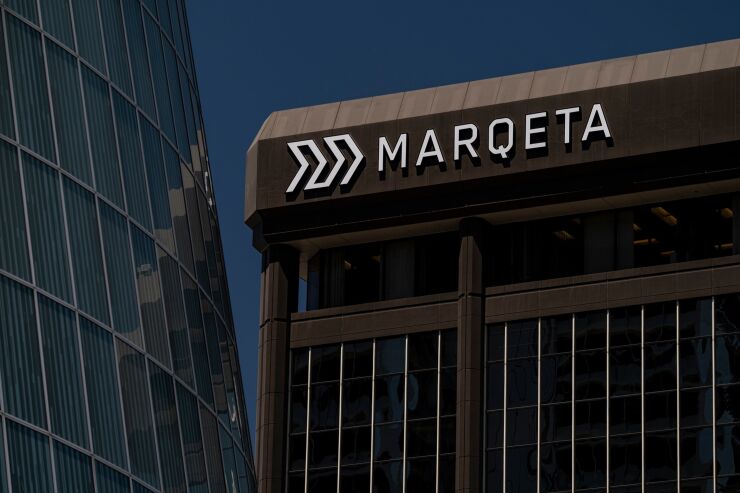As the company that powers transactions for Uber, Doordash and Square, Marqeta is behind the scenes of many of the companies most pivotal to the gig economy.
The Oakland, California-based Marqeta sold more than 45 million shares in its Nasdaq debut on Wednesday. At $27 per share that surpasses Marqeta's marketing offer of $20 to $24 per share and places its market value is $14.3 billion as a result of the listing, according to
The IPO came at a turning point for the market Marqeta serves. Delivery services experienced wider adoption during the pandemic — and as lockdowns and mask mandates lift, there should be a rekindled interest in travel-related gig work such as Uber driving.
"Payment is seamless and embedded in most software now," said Vidya Peters, chief marketing officer at Marqeta. "Whether people are shopping online or ordering food, payment is part of that experience and companies are reaching out to build more of these experiences tied to payments."

Marqeta has also gotten a bump from Square, which provides a majority of Marqeta's revenue. Marqeta supports Square's small-business debit card and Square's Cash app — which Square has used to drive its
Cash also serves as a venue for
"We've had an incredible set of tailwinds over the past year as payments become increasingly digital," Peters said.
These companies mostly offer payment services under their own brands, with Marqeta providing the technology to manage cards and transaction processing.
"Marqeta is the white-labeled platform under the hood powering the new flashy sports car functionality offered by fintechs," said Richard Crone, a payments consultant.
Marqeta is an issuer and processor for physical and virtual prepaid, debit and credit cards. Founded in 2010, Marqeta reported $108 million in the first quarter of 2021, or double the prior year as its net loss narrowed to $12.8 million from $14.5 million.
Marqeta is one of a series of
All of these firms are diversifying product lines beyond core payment acceptance and enrollment as a way to entice their attractiveness to investors and clients.
"Marqeta was among the first wave of companies working on fixing the existing plumbing of the financial system," said Hussein Ahmed, founder and CEO of San Francisco-based financial technology company Oxygen, adding the IPO will draw attention to other companies that offer a mix of card issuing and processing. "Let’s not forget that Marqeta has been at it now for over a decade, as the problems these companies are solving require reconfiguring often decades old infrastructure."
Marqeta was one of the early companies to use open technology tools such as application programming interfaces to support card issuance and payment processing. It later added security technology to accommodate
Marqeta's distribution strategy relies on deployment through other firms such as the aforementioned Uber, Doordash and Square with embedded payment functionality, referred to historically as card-on-file, according to Crone.
"But unlike the braindead card-on-file of most legacy issuers, Marqeta has enhanced their offering with dynamic spending controls, widgets, point of sale lending and other customized features," Crone said. "For example, the spending controls applied to an instantly issued debit card to Doordash and Uber drivers."
Marqeta's competitors include API firms such as Stripe, which has also benefited from the digital payments migration to reach a
The incumbent payment processors are also pursuing a combination of card issuing and merchant acquiring, coming off of a series of
“The nimbleness of fintechs and their ability to quickly pivot to introduce innovative functionality, to address specific needs, is causing legacy players to rethink their digital strategy and look harder at the partner integrations available to them," said Joanne Dewar, CEO of Global Processing Services, a London-based issuer and processor that serves challenger bank clients such as Revolut, Starling Bank and Curve. "It is vital to leverage the capabilities of agile partners in the issuer-processing space, to reduce that risk of losing relevance."





